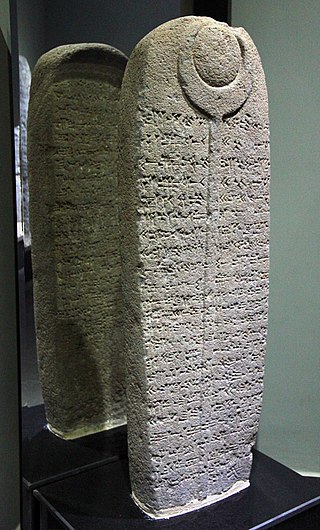The Book of Kings is a book in the Hebrew Bible, found as two books in the Old Testament of the Christian Bible. It concludes the Deuteronomistic history, a history of ancient Israel also including the books of Joshua, Judges, and Samuel.

Hadad, Haddad, Adad, or Iškur (Sumerian) was the storm and rain god in the Canaanite and ancient Mesopotamian religions. He was attested in Ebla as "Hadda" in c. 2500 BCE. From the Levant, Hadad was introduced to Mesopotamia by the Amorites, where he became known as the Akkadian (Assyrian-Babylonian) god Adad. Adad and Iškur are usually written with the logogram 𒀭𒅎dIM—the same symbol used for the Hurrian god Teshub. Hadad was also called Rimon/Rimmon, Pidar, Rapiu, Baal-Zephon, or often simply Baʿal (Lord), but this title was also used for other gods. The bull was the symbolic animal of Hadad. He appeared bearded, often holding a club and thunderbolt and wearing a bull-horned headdress. Hadad was equated with the Greek god Zeus, the Roman god Jupiter, as well as the Babylonian Bel.

Baasha was, according to the Hebrew Bible, the third king of the northern Israelite Kingdom of Israel. He was the son of Ahijah of the Tribe of Issachar. Baasha's story is told in 1 Kings 15:16–16:7.

Asa was, according to the Hebrew Bible, the third king of the Kingdom of Judah and the fifth king of the House of David. Based on the Biblical chronology, Biblical scholars suggest that he reigned from the late 10th to early 9th century BCE. He was succeeded by Jehoshaphat, his son. According to Edwin R. Thiele's chronology, when Asa became very ill, he made Jehoshaphat coregent. Asa died two years into the coregency.

Hazael was a king of Aram-Damascus mentioned in the Bible. Under his reign, Aram-Damascus became an empire that ruled over large parts of contemporary Syria and Israel-Samaria. While he was likely born in the greater Damascus region of today, his place of birth is unknown, with both Bashan and the Beqaa Valley being favoured by different historians.

Hadadezer ; also known as Adad-Idri, and possibly the same as Bar- or Ben-Hadad II, was the king of Aram-Damascus between 865 and 842 BC.

Bar-Hadad III (Aram.) or Ben-Hadad III (Heb.) (בֶּן-הֲדַד) was king of Aram Damascus, the son and successor of Hazael. His succession is mentioned in 2 Kings. He is thought to have ruled from 796 BC to 792 BC, although there are many conflicting opinions among Biblical archaeologists as to the length of his reign.

The Kingdom of Aram-Damascus was an Aramean polity that existed from the late-12th century BCE until 732 BCE, and was centred around the city of Damascus in the Southern Levant. Alongside various tribal lands, it was bounded in its later years by the polities of Assyria to the north, Ammon to the south, and Israel to the west.

The word Hanani means "God has gratified me" or "God is gracious".
Ramah was, according to the Hebrew Bible, a city in ancient Israel in the land allocated to the tribe of Benjamin. It was located near Gibeon and Mizpah to the West, Gibeah to the South, and Geba to the East.

Jehu son of Hanani was a prophet mentioned in the Hebrew Bible, who was active during the 9th century BC.
Ben-Hadad I, son of Tabrimmon and grandson of Hezion, was king of Aram-Damascus between 885 BCE and 865 BCE. Ben-Hadad I was reportedly a contemporary of kings Baasha of the Kingdom of Israel and Asa of the Kingdom of Judah.
Hezion may refer to two kings of Aram Damascus.
Hadad the Edomite is a character mentioned in the First Book of Kings who was an adversary of King Solomon after Solomon turned to idols. Some scholars believe the text should read Hadad the Aramean.
And the LORD raised up an adversary against Solomon, Hadad the Edomite.
Rezon the Syrian, also named "Ezron", was an enemy of King Solomon mentioned in 1 Kings 11. Some 19th-century scholars considered Rezon to be the throne name of King Hezion. He is known only from the Hebrew Bible.

The Pazarcık Stele is an Assyrian monument which functioned as a boundary stone erected by the Assyrian king Adad-nirari III in 805 BC to demarcate the border between the kingdoms of Kummuh and Gurgum. The reverse and obverse of the stele have been inscribed in the Akkadian language in different times.

2 Kings 8 is the eighth chapter of the second part of the Books of Kings in the Hebrew Bible or the Second Book of Kings in the Old Testament of the Christian Bible. The book is a compilation of various annals recording the acts of the kings of Israel and Judah by a Deuteronomic compiler in the seventh century BCE, with a supplement added in the sixth century BCE. This chapter records Elisha's acts in helping the family of Shunammite woman to escape famine, then to gain back their land and in contributing to Hazael's ascension to the throne of Syria (Aram) in verses 7–15; then subsequently records the reigns of Joram and Ahaziah, the kings of Judah.

The Melqart stele, also known as the Ben-Hadad or Bir-Hadad stele is an Aramaic stele which was created during the 9th century BCE and was discovered in 1939 in Roman ruins in Bureij Syria. The Old Aramaic inscription is known as KAI 201; its five lines reads:
“The stele which Bar-Had-
-ad, son of [...]
king of Aram, erected to his Lord Melqar-
-t, to whom he made a vow and who heard his voi-
-ce.”

1 Kings 22 is the 22nd chapter of the First Book of Kings in the Old Testament of the Christian Bible or the first part of Books of Kings in the Hebrew Bible. The book is a compilation of various annals recording the acts of the kings of Israel and Judah by a Deuteronomic compiler in the seventh century BCE, with a supplement added in the sixth century BCE. This chapter belongs to the section comprising 1 Kings 16:15 to 2 Kings 8:29 which documents the period of the Omrides. The focus of this chapter is the reign of king Ahab and Ahaziah in the northern kingdom, as well as of king Jehoshaphat in the southern kingdom.

2 Chronicles 16 is the sixteenth chapter of the Second Book of Chronicles the Old Testament in the Christian Bible or of the second part of the Books of Chronicles in the Hebrew Bible. The book is compiled from older sources by an unknown person or group, designated by modern scholars as "the Chronicler", and had the final shape established in late fifth or fourth century BCE. This chapter belongs to the section focusing on the kingdom of Judah until its destruction by the Babylonians under Nebuchadnezzar and the beginning of restoration under Cyrus the Great of Persia. The focus of this chapter is the reign of Asa, king of Judah.












